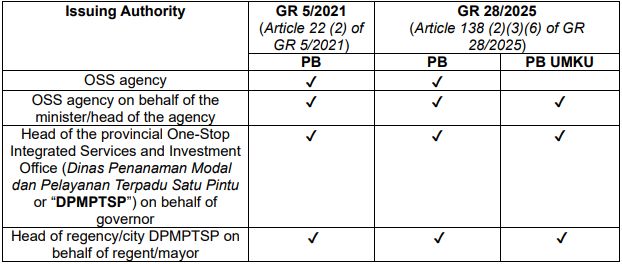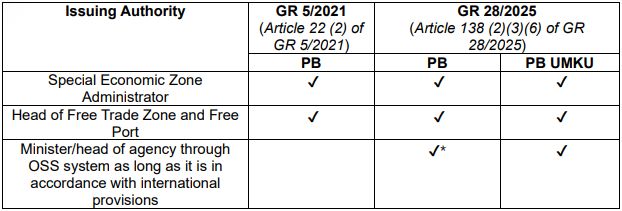- within Government and Public Sector topic(s)
- in Canada
- within Real Estate and Construction, Employment and HR and International Law topic(s)
- with readers working within the Retail & Leisure industries
On 5 June 2025, the Government of Indonesia issued a new regulation, which significantly affect the risk-based business licensing. Government Regulation ("GR") No. 28 of 2025 on Risk-Based Business Licensing ("GR 28/2025"), effectively revoking and replacing the previous regulation, GR No. 5 of 2021, as amended by GR No. 11 of 2023 ("GR 5/2021"). While several amendments will be discussed in this Article, the provisions on basic requirements, such as Business Licensing (Perizinan Berusaha or "PB"), and/or Business Licensing to Support Business Activities (Perizinan Berusaha untuk Menunjang Kegiatan Usaha or "PB UMKU") remain in force as they do not conflict with the new GR 28/2025 (Article 550 paragraph b and Article 552 of GR 28/2025). GR 28/2025 streamlines the main framework of GR 5/2021, which regulated the risk level and business scale determinations, the basic requirements of Business Licensing, as well as nationwide supervision and evaluation mechanisms on verifying Business Licensing (General Elucidation Appendix of GR 5/2021), thereby facilitating business establishment and management, also improving the quality of licensing services to support job creation (Points a and b of Considerations of GR 28/2025).
Given the broad scope of this new framework, this Legal Insight limits its discussion to a summary of the following topics: (i) Risk Based Licensing Procedures (Perizinan Berusaha Berbasis Risiko or "PBBR"), (ii) PB Norms, Standards, Procedures, and Criteria, (iii) Online Single Submission ("OSS") Service Subsystem, (iv) Positive Fictitious Mechanism, and (v) Enactment Provisions.
PBBR
While GR 28/2025 retains the key provisions on PB and risk levels previously regulated under GR 5/2021, the new framework under GR 28/2025 has added two chapters to the scope of PBBR implementation, namely: (i) Basic Requirements (Chapter II) and (ii) PB UMKU (Chapter IV). GR 28/2025 has also expanded the list of sectors overseen by PBBR from 16 to 22 sectors. Accordingly, 6 new sectors are now regulated under GR 28/2025, namely the (i) legal metrology; (ii) creative economy; (iii) geospatial information; (iv) cooperatives; (v) investment; and (vi) organization of electronic systems and transactions (Article 6 of GR 28/2025).
In addition, GR 28/2025 now provides a more detailed and comprehensive elaboration on the two stages in carrying out business activities:
- Starting a Business: As stipulated in Article
7 paragraph a and Article 8, paragraph 1 of GR 28/2025, the three
sub-stages in starting a business are, namely:
- Fulfilment of business legality requirements;
- Fulfilment of basic requirements, including Conformity of Space Utilization Activities (Kesesuaian Kegiatan Pemanfaatan Ruang or "KKPR") and Environmental Approval (Persetujuan Lingkungan or "PL") for businesses that are not required to have Environmental Impact Analysis (Analisis Mengenai Dampak Lingkungan Hidup or "Amdal") or Environmental Management Efforts and Environmental Monitoring Efforts (Upaya Pengelolaan Lingkungan Hidup dan Upaya Pemantauan Lingkungan Hidup or "UKL-UPL"); and
- Obtaining or applying for PB in accordance with the relevant business activity.
- Operating a Business: Pursuant to Article 7
Point b, Article 9 paragraph 2, and Article 10 of GR 28/2025, the
two sub-stages in operating a business are, namely:
- Preparation Stage: The prospective business
must attend to several goalposts before establishing business
operations:
- land procurement;
- fulfilment of basic requirements (PL, Amdal/UKL-UPL, building approval);
- building construction;
- equipment or facilities procurement;
- human resources procurement;
- fulfilment of business standards; and/or
- fulfilment of PB requirements; and
- Operational and/or Commercial Stage: The
actual business activities following the preparation stage are,
namely:
- production, logistics, and distribution;
- marketing of goods and/or services; or
- other activities for operational and/or commercial purposes.
- Preparation Stage: The prospective business
must attend to several goalposts before establishing business
operations:
PB Norms, Standards, Procedures, and Criteria
In general, the PB norms, standards, procedures, and criteria are formulated and stipulated by the central government. They serve as the sole reference for the central and regional governments in implementing PBBR. However, the new provisions emphasize that regional heads are now prohibited from expanding the provisions of GR 28/2025 when formulating their internal implementing regulations (Article 21 of GR 5/2021 and Article 137 of GR 28/2025).
Another significant change in GR 28/2025 is the clear separation on licensing procedure of the general PB and that of PB UMKU. Ministers or Agency Heads are now only permitted to enact the approval for PB UMKU, as reflected in the division of institutional authorities shown in the following table:


In business activities involving foreign direct investment or investment using foreign capital based on an agreement between the central government and the government of another country, the PB issuance is authorized to the OSS agency or the OSS agency on behalf of the minister or head of agency (Article 138 paragraph 4 of GR 28/2025).
OSS Service Subsystem
GR 28/2025 expands the OSS service subsystems, previously covered only the information services, PB, and supervision under Article 167 Paragraph 2 of GR 5/2021, by adding the basic requirements, investment facilities, and partnerships (Article 188 paragraph 3 of GR 28/2025). To access the OSS, Individuals, Business Entities, Public Corporations, Associations/Partnerships, and Representative Offices must register by filling out forms on the website (Article 204 of GR 28/2025).
While retaining most provisions of the previous subsystem from GR 5/2021, GR 28/2025 specifies that the following types of information are provided through three new subsystems:
- Basic Requirements: As per Article 217 of GR 28/2025, this subsystem will contain the publicly accessible information on: (i) KKPR; (ii) PL; and/or (iii) building approval and certificate of feasibility for building function.
- Investment Facility: This subsystem will
provide, at least, eight types of services accessible upon
acquiring the necessary access rights. Business actors are provided
with the opportunity to apply for:
- Exemption of import duties on machinery, goods, and materials for investment purposes; capital goods for public electricity generation; or exemption/reduction of import duties on goods for a contract of work/coal mining concession agreement;
- Corporate income tax reduction or income tax facility for investments in certain business fields/regions;
- Gross income deduction for internship, apprenticeship, or learning activities, or for certain research and development activities; and/or
- Net income deduction facility for new investment or business
expansion in certain labour-intensive industrial sectors.
(Article 235 of GR 28/2025)
- Partnership: Access right holders will be able to access the following information on the OSS: (i) partnerships in accordance with the relevant investment regulations; (ii) other partnerships required under the prevailing laws and regulations; (iii) voluntary partnerships as conducted by Business Actors; and (iii) monitoring and evaluation on the implementation of partnership commitments (Article 236 of GR 28/2025).
Positive Fictitious Mechanism
GR 28/2025 introduces the positive fictitious (fiktif positif) approval mechanism, a legal provision that allows the subsequent process to proceed if government officials or agencies do not issue a decision within estimated time limit for their approval. This mechanism aims to provide legal certainty for business actors by setting clear and measurable timeframes, thereby preventing confusion and potential losses for business actors (Appendix on General Elucidation of GR 5/2021). This mechanism applies to:
- KKPR: If the relevant agency does not issue the technical land consideration for KKPR within 20 working days from the date of receipt of a complete application, the KKPR will be automatically issued without the technical land consideration (Article 22 paragraph 3 of GR 28/2025). This provision ensures that the land use approval cannot be indefinitely delayed due to administrative negligence.
- Environmental Technical Approval: For
technical approvals related to environmental standards (such as
wastewater, emissions, or the management of hazardous and toxic
waste/B3), GR 28/2025 sets strict issuance deadlines: 30 working
days for wastewater and emission standards, and 16 working days for
B3 waste assessments, calculated from the date the application is
declared complete and correct. If the relevant authority fails to
meet these deadlines and the application is already complete, the
business actor may directly apply for environmental approval by
attaching proof of submission of the technical approval
application, even if the technical approval has not yet been issued
provided that the business actor has already attempted to make
initial application of the approval alongside rec (Article 83
of GR 28/2025).
This provision prevents environmental technical approvals from becoming a licensing bottleneck, and it should be noted that the process is carried out outside the OSS through a dedicated government information system according to the type of approval.
- Medium-High and High Risk PBBR: For medium-high risk businesses, if the competent authority does not verify the standard certificate and input the results into the OSS within the stipulated timeframe, the system will automatically deem the certificate verified (Article 225 of GR 28/2025). For high-risk businesses, if the verification of licensing requirements is not carried out in time, the OSS will automatically issue the business license (Article 230 of GR 28/2025). These provisions are intended to ensure that business actors are not hindered by administrative delays in the verification process.
Enactment Provisions
With the enactment of GR 28/2025, the Government of Indonesia is required to update the OSS system and the Indonesia National Single Window system, and is also committed to issuing the relevant implementing regulations for the new framework no later than four months from the promulgation of GR 28/2025, i.e., by October 5, 2025. (Article 551 paragraphs a and b of GR 28/2025). Meanwhile, business actors should note that any system access right obtained prior to enactment of GR 28/2025 must be renewed through the OSS system in accordance with the notifications that will be sent to the email address previously registered in the system. (Article 548 of GR 28/2025)
Concluding Remarks
GR 28/2025 introduces a comprehensive reform to Indonesia's PBBR system by adding new chapters, expanding the covered sectors, separating the procedure of the general acquisitions of PB and PB UMKU, enhancing the OSS service subsystem, and introducing a positive fictitious mechanism to ensure legal certainty and prevent administrative bottlenecks. The regulation also includes transitional provisions requiring the OSS system update and the issuance of implementing regulations no later than 5 October 2025, thus business actors are expected to promptly align their licensing processes with the new framework.
The content of this article is intended to provide a general guide to the subject matter. Specialist advice should be sought about your specific circumstances.



